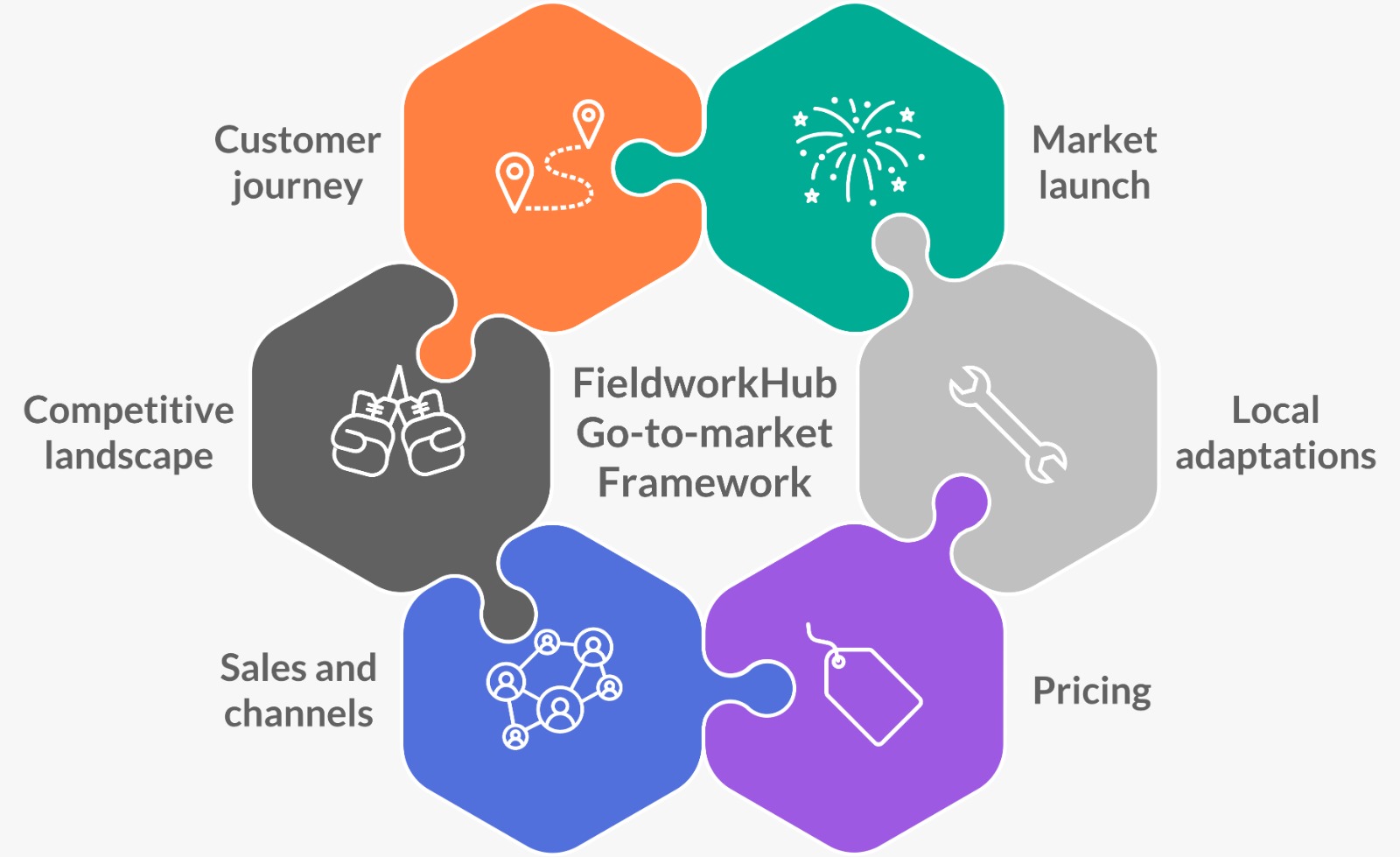In our globalised and hyper-connected world, entering new geographical markets has become more important than ever before. But making that expansion a success is a challenge. In B2B, competition is rife. Buying processes vary massively from country to country, and in most cases, competitors will already have a foothold in the region. In this article, we share how you can turn your go-to-market (GTM) strategy into a GTM success with market research.
What is a B2B go-to-market strategy?
A B2B go-to-market strategy is a company’s plan to sell in a market and win new business reliably and repeatedly. Which is essential for companies seeking to scale internationally. It consists of six key elements:
Customer journey - How do customers typically find out about the products and services that you sell? What journey will you take customers on to commit? What are the key touchpoints?
Competitive landscape - What is the competitive landscape within the region, and what are your strengths and weaknesses compared to your competitors? What are your key sources of competitive advantage?
Sales and channels - Where and how will you find leads? Will you sell directly to end customers or work through partners? If using partners, how will sales revenue be divided up?
Pricing - How much are customers willing to pay for your goods and services? Will it be a one-off purchase or will there be recurring payments?
Local adaptations - Do you need to add features to your product or service to make it more suitable for new markets and convince potential customers to buy? Does your branding and packaging appeal to that culture? For example, different colours mean different things to cultures.
Market launch - How will you launch across the country? What types of launch marketing are likely to be most effective?

Some of the questions that you need to answer before moving into a new market are:
- How are purchasing decisions made?
- What marketing budget is typically required to make an impact?
- What is the sales culture in the geographical market and market sector?
- Who will be your product champions, and how can you find them?
- What cultural, social and business norms do you need to consider?
Why do B2B teams need to conduct GTM research?
It’s easy for B2B teams to spend too much time and resources on sales and marketing activities that are ultimately unsuccessful. These can range from reaching out to prospects who are not ready to buy, to attempting to reach customers using inappropriate channels. There is also the danger of going into a market without understanding specific cultural business practices: for example, the way people do business in China is very different to the way we do it in the UK.
Conducting quality market research before launching in a region gives B2B businesses the ability to create a competitive advantage, by giving them a greater understanding of the specific region or country. It helps firms understand what the customer is already using, where the gaps are and what price they might be willing to pay for a product or service that better meets their needs. By identifying country-specific factors through market research, companies can develop tailored marketing strategies, increase sales, and reduce costs.
How do you test new B2B markets?
There are many ways to collect data and test hypotheses when looking to target B2B markets. Typically, firms start by conducting secondary (desk) research, but it’s very helpful to engage directly with potential customers and partners through primary research.
At FieldworkHub, we have helped many B2B businesses to incorporate primary market research in their international launch programmes. Here are a couple of ways we can help you on your journey to expansion:
GTM B2B In-Depth Interviews / IDIs
Conducting in-depth interviews helps you and your team to understand specific challenges within organisations. Senior B2B respondents can inform you about regional buying trends, the competitive landscape and current pain points which you may be able to eliminate. This can help you plan your product roadmap and formulate messaging around the needs of your target buyers and internal champions. In a one-to-one setting, business decision makers will often speak more candidly than they would in a group discussion so IDIs are particularly useful in the early stages of a launch programme when you are focused on data gathering.
GTM B2B focus groups
By contrast, you are more likely to use B2B focus groups in the later stages of a launch programme, to test that your proposed feature set meets the key requirements of most potential customers and check that marketing messages resonate with your target audience.
GTM B2B Online Bulletin Boards
A B2B online bulletin board can be thought of as something of a hybrid between IDIs and focus groups because it involves a group of B2B profiles participating at the same time, but typically each participant is involved in a one-to-one dialogue with the bulletin board moderator. One of the great advantages of using bulletin boards in a B2B context is that busy participants can typically log on to complete the latest tasks whenever they have a moment, instead of needing to join at a fixed time. Because online bulletin boards typically run over several days, they are also great for iterating your approach.
Make market research core to your GTM strategy
Going into a new market blind can be very risky. You might not immediately understand the competitive landscape, your product or service might not fit the needs of the market as snugly as you would like, and the marketing and sales playbooks you relied on previously might not play so well.
Conducting solid GTM research increases your chances of success and gives your teams the confidence to know the competitive advantages you have over your competitors. But, more importantly, it helps to empower product teams to create unique experiences tailored to the specific needs of the country or region you are looking to expand into.

